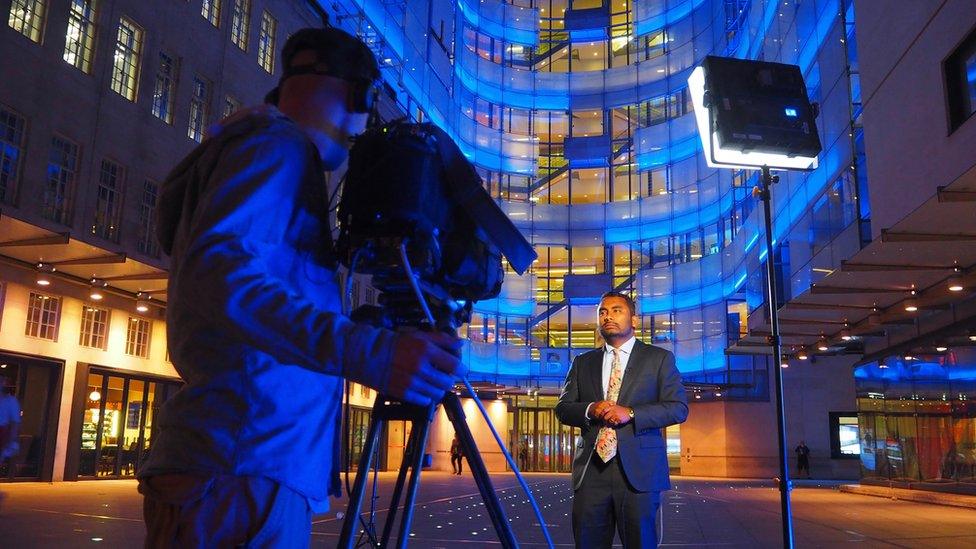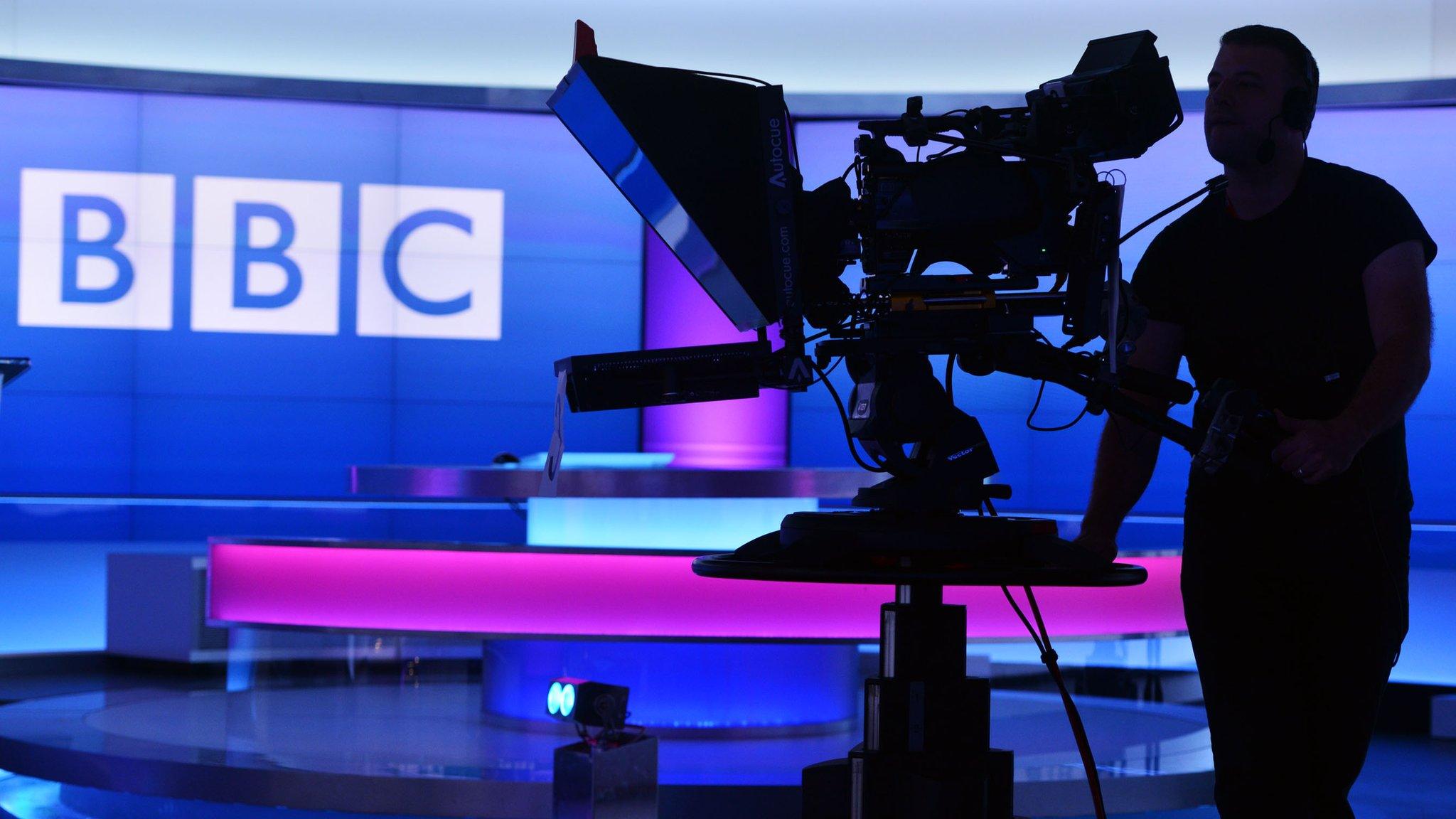A radical experiment, at an uncertain time, for BBC News
- Published

The BBC announced in 2016 it needed to save £800m by 2022; BBC News was to provide £80m of those savings, and it is only half way to that target.
The BBC is struggling to connect with many British people - especially those from poorer socio-economic backgrounds, and - even more so - those under 35.
The licence fee, which accounts for around 75% of the BBC's revenue, is under unprecedented political and structural pressure.
These three facts have driven the changes announced today. The first made pain inevitable; the second has determined the nature of the cuts announced; the third means the audience the BBC has in mind when making these changes isn't just licence fee payers - it's the inhabitants of 10 Downing Street.
In requiring another £40m of savings, the BBC faced a choice.
Either continue with the current operating model and shut particular services or programmes (the BBC News Channel, for instance); or fundamentally change the operating model. This would save as many programmes as possible, while also creating a newsroom that was digital first and could connect with audiences whose fidelity was weak or non-existent.
The BBC's director of news Fran Unsworth has chosen the latter path. There are very strong arguments for it.
Contrary to popular belief, the strongest argument is not that if you shut The World at One on Radio 4 or Newsnight on BBC Two (having already announced the closure of The Victoria Derbyshire Show) there would be an outcry. Although they are obviously not seeking to create an outcry - indeed would rather not be making any savings - any public protest about shut programmes or services actually helps the BBC's management in its upcoming negotiations with the government.
In fact, the strongest argument for a fundamental change in the operating model of BBC News is that the old model is financially wasteful, and digitally weaker than it should be.
A quite astonishing proportion of the journalism created by BBC News reaches a tiny fraction of the population.
In the dreadful jargon of the industry, many audiences are super-served. That is, if you're a middle-class professional living in London, Oxford or Exeter, you're getting money thrown at you by BBC News. You're perhaps the kind of eccentric who might listen to Today, watch the 10 O'Clock News on BBC One and Newsnight. And that's where BBC News is focusing its resources.
Next, there is of course duplication, where several BBC journalists from different programmes attend the same event. There is a defence of this (which we'll come to); but in a time of financial strain it becomes harder to justify.
The operation of BBC News can seem at times to be very far from joined up. Again, there is an editorial defence of this. The organisation is so vast and sprawling that a few people can't know what every producer is up to. But at times senior executives have been caught blindsided by (often very strong) ideas from parts of BBC News that are similar to existing projects.
Above all, the current operation, in which programmes are king, queen and emperor rolled into one, may be sub-optimal in generating reach. The best journalism is not travelling as far and wide as it should, either because it appears on programmes that reach too few people (again, those programmes would say, 'Good for us!'), or because the lack of a centralised commissioning structure means executives aren't driving a story throughout the day, week and month, as they should.
All that lends credence to the idea that a new method is better. But before turning to the very significant difficulties with this new method, it is worth pointing out that while it might contain a lot of method, it's not actually new.
Since the internet turned general daily news into a near-universal commodity, the business model of journalism has taken a battering. This has driven consolidation, within companies or between them. Consolidation is attractive to companies because it offers potential editorial and back office savings.
Usually when this is on the horizon, management consultants - whose mastery of Microsoft Excel and actual experience of journalism are in inverse proportion - are brought in to say: "The world has changed! Go digital first! This way you can make the savings and reach more people!"
Most journalists in Britain will feel a weary familiarity at this point, having heard - or given - varieties of this speech many times before. (The phrase "content farm" often pops up). And they can expect to hear it again soon. For instance, I humbly predict, based on nothing other than recent history, that the coming integration of The Times and Sunday Times into more of a seven-day operation will involve a similar structure, with digital platforms prioritised.
And why not? Except here's the rub.
Often when this has been tried before, it is unwound, because editors on particular programmes (or particular sections of a newspaper) feel disempowered and undermined. They don't want to be passive recipients on a content conveyor belt. They want the shortest possible distance between broadcast, or publication, and the journalism - with them acting as vital middle man or woman.
Editors on programmes (or newspaper sections) see it as their job to commission ideas and curate journalism. Moving to a centralised structure potentially puts that editorially exciting task further up the food chain.
There is an obvious response to this of course, which is that BBC News will have programme editors who are still vital. But right now, those programme editors can call a journalist, commission an idea, and let the relevant people know. In future, they will have to negotiate with a quasi-omniscient commissioner, in charge of a story division.
And who, ultimately, is in charge under the new structure? Who walks the plank if there is an editorial, or legal, mistake? The commissioner who is driving the story through the day - or the programme output editor who was the last human between the idea and the broadcast?
This brings us onto the complicated but significant benefits of an operating model where programmes are in charge.
There are an infinite number of reasonable criticisms of the BBC; but one mistake that critics often make is to treat the BBC as a homogenous lump, rather than thousands of (frequently irascible and rebellious) journalists around the world working on hundreds of programmes and many platforms.
This error causes some critics to castigate the BBC for the very thing that some audiences treasure: the intellectual freedom to make brave editorial decisions.
The BBC is not like a newspaper with various sections, but one coherent authorial voice. It is like a collection of newspapers, TV channels and programmes, and radio channels and programmes all in one. Plus a giant website. Critics argue this shows imperial ambition. But to the extent that these programmes are strong, it is because they are led by journalists who exercise judgements.
Take a practical example.
Say BBC News is planning a year of major outside broadcasts and special projects on climate change ahead of the UN conference in Glasgow in November. As part of this - I'm making this up by the way - the PM programme on Radio 4 decides to investigate plant-based meat, to see if it really is a saviour of the planet. It commissions a top journalist, with a budget for travel to a factory in Norway that is leading the way.
One fine morning a week later, in the 9am news conference, this exciting proposition is mentioned as one of the prospects for the day. There is talk of when to roll the story out. At which point, the news editor for Radio 5 Live pipes up to say that, weirdly enough, they too have commissioned a special series on plant-based meat after a particularly lively phone-in, and one of their reporters has been to a different factory, this one in Portugal.
If you generally believe - perhaps with good reason - that the BBC is bloated and wasteful, this will strike you as absurd. Why send two reporters to cover the same story? Just send one, and farm out the material to both places. You can be reassured that the new operating model is designed to stop this happening. A commissioner in the 'Planet' division would know in the first instance what was happening and - crucially - control the budget that pays for the crew.
Yet there is a counter-view, which is that it is precisely the freedom that the editors of PM and 5 Live have - to come up with exciting ideas, talk to reporters, and shape the output to their own tastes and that of their very different audiences - that makes both products strong. In the new world, might these very distinct offers to the licence fee payer suffer from homogeneity, losing their editorial sharpness?
Like I said, we've been here before, of course. Many times.
In 2004, a different epoch in modern news, the BBC published The Neil Report, chaired by a former director of news and current affairs, Ronald Neil.
He looked at all these issues - and concluded that a programme-led model was best. Written 15 years ago, his conclusions read almost like a pre-emptive rebuke to the changes announced today.
"The BBC transmits hundreds of hours of news and current affairs output every day," the report said. "As the custodians of the BBC's editorial values, individual editors and executive producers must take the day-to-day responsibility for them."
It went on: "Presenters are answerable to their individual editors and in all of their journalistic work must embody the BBC's core editorial values."
The world has changed enormously since Lord Hutton's 2004 report into the BBC's failures surrounding the death of Dr David Kelly. Even back then, the challenges faced by the BBC were as nothing compared to today.
The current bosses of BBC News can plausibly argue that these are the sorts of changes that they should be making anyway, and that financial and political imperatives left them with no choice.
Leadership is about making decisions; the tougher the decision, the greater the calibre of leadership required. Whichever path BBC News took would have been painful. If anything, they have taken the braver decision, in trying to solve two problems at once - the financial challenge and the problem of connecting with poorer and younger audiences.
Adapt or die is a passable motto for modern media, particularly the publicly-funded kind. The BBC faces an existential crisis. It's one hell of a moment for arguably the BBC's most important division to undertake a radical experiment.
If you're interested in issues such as these, you can follow me on Instagram, external, Twitter, external or Facebook, external; and subscribe to The Media Show podcast from BBC Radio 4.
- Published29 January 2020

